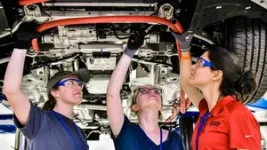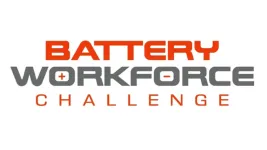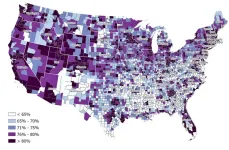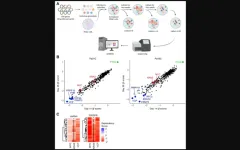(Press-News.org) Wastewater from biorefineries that convert plants into fuel is full of organic materials that cannot be efficiently treated with conventional wastewater systems, making it costly and energy-intensive to manage.
However, those rich organic materials are an untapped source of chemical energy that can be recovered as valuable products, including biogas, a clean-burning renewable fuel.
A study by researchers at the Department of Energy’s Center for Advanced Bioenergy and Bioproducts Innovation (CABBI) found that recovering resources from wastewater can substantially improve the economic and environmental sustainability of second-generation biorefineries, supporting the transition to a sustainable, plant-based biofuels and bioproducts industry. The CABBI team designed a process that simultaneously treats wastewater and recovers biogas energy that could generate revenue for biorefineries — while lowering costs and greenhouse gas emissions compared to conventional treatment systems.
The work, published in ACS Sustainable Chemistry & Engineering, united researchers from all three CABBI themes — Feedstock Production, Conversion, and Sustainability — who are developing plant-based alternatives to petroleum for fuels and chemical products. With a “plants as factories” model, they aim to produce biofuels, biochemicals, and foundation molecules directly in plant leaves and stems; develop unique tools, yeasts, and processing methods to convert them into high-value bioproducts, such as biodiesel, organic acids, lubricants, and alcohols; and assess the economic and ecological sustainability of CABBI feedstocks, biofuels and bioproducts, from the field to the biorefinery to the bioeconomy.
The wastewater study was led by two CABBI Sustainability researchers at the University of Illinois Urbana-Champaign: Jeremy Guest, Associate Professor of Civil and Environmental Engineering (CEE); and Research Scientist Yalin Li of the Institute for Sustainability, Energy, and Environment (iSEE). CABBI co-authors included Vijay Singh, Conversion researcher, Deputy Director for Science & Technology, and Professor of Agricultural and Biological Engineering (ABE) at Illinois; and Feedstock Production researcher Fredy Altpeter, Professor of Agronomy at the Institute of Food and Agricultural Sciences at the University of Florida.
Second-generation biorefineries that process miscanthus, corn stover, or other non-food feedstocks have the potential to produce biofuels and bioproducts with much lower environmental impact than those from fossil fuels or first-generation biorefineries, which use corn and other edible crops. But these second-generation biorefineries still face financial hurdles that prevent their successful deployment in the real world.
If not properly managed, biorefineries can require a prohibitive amount of water and generate a large wastewater stream. To produce fuel and valuable biochemicals from plant biomass, biorefineries can use up to 10 liters of water per liter of biofuel produced, based on a previous CABBI study. The resulting wastewater has high concentrations of organic material — sugars, residual fermentation products, process byproducts, or other chemicals — making it difficult to reuse.
But those prior analyses are often based on conventional, low-rate wastewater treatment technologies that are expensive, energy-intensive, and require a huge physical footprint — which, depending on the size of the plant, could be equivalent to 30 football fields or more. Low-rate conventional treatment systems use large aerobic reactors, which consume large amounts of electricity for aeration, and convert the organic materials from the wastewater to carbon dioxide without creating valuable products.
The CABBI team designed a high-rate anaerobic-dominant wastewater process that largely eliminated aeration, saving electricity, and instead incorporated emerging technologies, including internal circulation and anaerobic membrane bioreactors to recover the embedded energy in the organic materials as biogas. For their design, they used experimental data from wastewater generated by the processing of sugarcane and oilcane cultivated by the Altpeter group for CABBI’s Feedstocks to Fuels project. The process extracts the plant’s oils and then generates ethanol from plant sugars through fermentation by yeasts. The Singh group provided spent fermentation broth, after the ethanol was extracted, and collaborators from the Pontificia Universidad Católica de Chile determined how much methane could be produced from the real samples.
Using their open-source software BioSTEAM, the researchers then simulated the integration of the new wastewater treatment process into seven biorefinery designs, covering a wide range of feedstocks and biofuels/bioproducts. Through techno-economic analysis and life cycle assessment (TEA-LCA) enabled by BioSTEAM, they found that the new process could substantially reduce the capital cost and energy usage of biorefineries, improving their financial viability and reducing their environmental impact.
The process could efficiently convert organic contaminants in biorefinery wastewater to biogas, achieving simultaneous energy recovery and wastewater treatment. It would reduce energy consumption, operating costs, and greenhouse gas emissions compared to conventional treatment systems.
“Through proper management processes, wastewater can be a potential source of revenue for biorefineries while improving the environmental sustainability of biofuels and bioproducts,” Li said.
The wastewater treatment process designed in this study can substantially improve the financial viability of second-generation biorefineries while reducing their environmental impacts, thus contributing to society’s transition to a circular bioeconomy — and CABBI’s mission to support a viable, sustainable domestic biofuels and bioproducts industry using plant biomass.
Other CABBI co-authors: George Kontos and Thomas Parkinson, CEE at Illinois; and Mothi Viswanathan, ABE at Illinois. Non-CABBI co-authors: Daniela Cabrera and Rodrigo Labutut, Pontificia Universidad Católica de Chile; and Nickolas Avila, CEE at Illinois.
END
Wastewater to energy: new treatment process can improve biorefinery sustainability
CABBI design simultaneously treats water and recovers biogas, generating revenue and reducing GHG emissions
2023-03-24
ELSE PRESS RELEASES FROM THIS DATE:
U.S. Department of Energy and Stellantis announce the Battery Workforce Challenge
2023-03-24
The U.S. Department of Energy (DOE) and Stellantis today announced the launch of the Battery Workforce Challenge, which includes a three-year collegiate engineering competition; vocational training; youth education in science, technology, engineering and math (STEM); and career and technical education.
DOE has set a bold target to address the climate crisis and puts our nation on a path to achieve net-zero emissions, economy-wide, by 2050 for the benefit of all Americans. Key to this target goal are the design and development of advanced batteries to electrify ...
Study finds higher risk of sleep problems in gay, lesbian, and bisexual youth
2023-03-24
Toronto, ON - A new national study, published in LGBT Health, finds that lesbian, gay, and bisexual (LGB) youth are twice as likely to report trouble falling or staying asleep than their straight peers. Greater depression, stress, and family conflict contribute to the sleep problems of LGB youth.
“Young people who identify as lesbian, gay, or bisexual may face discrimination and negative attitudes because of their sexual orientation. These experiences can make it harder for them to get a good night’s sleep,” says lead author, Jason Nagata, MD, assistant professor of pediatrics at the University of California, San Francisco. “Difficulties getting ...
UW researchers identify cell type that could be key to preventing marrow transplant complication
2023-03-24
A bone marrow transplant can be a lifesaving treatment for people with relapsed blood cancers, but a potentially lethal complication known as graft-versus-host disease put limitations on this procedure. New research from the University of Wisconsin–Madison is helping to change that by identifying the cell population that causes GVHD, a target that may make bone marrow transplants safer and more effective.
An allogenic (from a donor) bone marrow transplant is a common treatment for blood cancers and other diseases of the immune system. During the transplant, the patient’s immune cells are replaced with the donor’s ...
Buprenorphine after nonfatal opioid overdose results in reduced risk of overdose death
2023-03-24
Receiving medication for opioid use disorders, such as buprenorphine after an overdose, leads to lower mortality risk, according to a Rutgers study.
Drug overdose deaths are a significant public health concern in the United States. According to the National Center for Health Statistics, there were more than 105,000 drug overdose deaths in 2021, which were largely attributed to opioids. Rutgers researchers found that opioid-involved overdose deaths following nonfatal overdose events are largely preventable with buprenorphine medication for opioid use disorder.
The medication, approved by the Food and Drug Administration, is a highly effective ...
Narrowing the digital divide for health care
2023-03-24
Many parts of rural America with less access to health care also have limited broadband internet that could help them take advantage of increasingly popular online health services.
A new study by the University of Cincinnati highlighted disparities in access to digital technology that could widen the gap in access to health care. The study found that socially vulnerable communities in the United States face more barriers to adequate health care, live in areas with fewer health care resources and have less access to high-speed internet.
UC researchers ...
Corporate investment could improve climate-tech innovation
2023-03-24
MADISON—Corporate investments in climate-tech start-ups are a growing but overlooked aspect of energy innovation. According to a new report from Morgan Edwards, a professor at the La Follette School of Public Affairs at the University of Wisconsin–Madison, and her lead co-author at University of Maryland, these investments should be more fully considered as methods to advance climate technology. The report was published in the journal Joule on March 17.
Start-up companies have the potential to rapidly commercialize innovation, but they don’t always have the resources to make such ventures successful. Corporations, on the other ...
Genes & Cancer | VCP/p97 as a therapeutic target in KRAS-mutant pancreatic cancer
2023-03-24
“In summary, our goal was to identify additional therapeutic targets for KRAS-driven PDAC.”
BUFFALO, NY- March 24, 2023 – A new research paper was published in Genes & Cancer on March 10, 2023, entitled, “VCP/p97, a pleiotropic protein regulator of the DNA damage response and proteostasis, is a potential therapeutic target in KRAS-mutant pancreatic cancer.”
Researchers have recently shown that proteins involved in the DNA damage response (DDR) are critical for KRAS-mutant pancreatic ductal ...
Finding the sweet spot in sugar reductions
2023-03-24
Putting less sugar in sodas and reducing the package size of sodas sold in supermarkets may help reduce our collective sugar intake and thus lower the associated health risks. Good news for consumers, but how does it affect manufacturers? Research conducted in the US has shown that marketing diet or sugar-free varieties does not lead to an increase in the overall turnover of soda manufacturers. This is because consumers tend to switch from sugary to sugar-free versions of the same brand. However, reducing the package size of soda does have a positive effect on the sales ...
New study about the ‘tsunami’ in Venus’s clouds
2023-03-24
A group of scientists from the University of Seville, in collaboration with experts from the University of the Basque Country, has led the first detailed study of the evolution of the discontinuity of Venus’s clouds, a gigantic atmosphere wave with the appearance of a “tsunami” that is propagated in the planet’s deepest clouds and which, it is believed, may be playing a very significant role in the acceleration of Venus’s fast-moving atmosphere. The observations were carried out non-stop for more than 100 days. “This observational ...
Substance use disorders do not increase the likelihood of COVID-19 deaths
2023-03-24
BOSTON – New research from Boston Medical Center found that substance use disorders do not increase the likelihood of dying from COVID-19. Published in Substance Abuse: Research and Treatment, the study showed that the increased risk for severe COVID-19 in people with SUD that has been seen may be the result of co-occurring medical conditions.
Multiple large cohort studies from early in the pandemic have shown higher rates of hospitalization, intubation, and death from COVID-19 in those with SUD, while other studies found no ...
LAST 30 PRESS RELEASES:
Brainwaves of mothers and children synchronize when playing together – even in an acquired language
A holiday to better recovery
Cal Poly’s fifth Climate Solutions Now conference to take place Feb. 23-27
Mask-wearing during COVID-19 linked to reduced air pollution–triggered heart attack risk in Japan
Achieving cross-coupling reactions of fatty amide reduction radicals via iridium-photorelay catalysis and other strategies
Shorter may be sweeter: Study finds 15-second health ads can curb junk food cravings
Family relationships identified in Stone Age graves on Gotland
Effectiveness of exercise to ease osteoarthritis symptoms likely minimal and transient
Cost of copper must rise double to meet basic copper needs
A gel for wounds that won’t heal
Iron, carbon, and the art of toxic cleanup
Organic soil amendments work together to help sandy soils hold water longer, study finds
Hidden carbon in mangrove soils may play a larger role in climate regulation than previously thought
Weight-loss wonder pills prompt scrutiny of key ingredient
Nonprofit leader Diane Dodge to receive 2026 Penn Nursing Renfield Foundation Award for Global Women’s Health
Maternal smoking during pregnancy may be linked to higher blood pressure in children, NIH study finds
New Lund model aims to shorten the path to life-saving cell and gene therapies
Researchers create ultra-stretchable, liquid-repellent materials via laser ablation
Combining AI with OCT shows potential for detecting lipid-rich plaques in coronary arteries
SeaCast revolutionizes Mediterranean Sea forecasting with AI-powered speed and accuracy
JMIR Publications’ JMIR Bioinformatics and Biotechnology invites submissions on Bridging Data, AI, and Innovation to Transform Health
Honey bees navigate more precisely than previously thought
Air pollution may directly contribute to Alzheimer’s disease
Study finds early imaging after pediatric UTIs may do more harm than good
UC San Diego Health joins national research for maternal-fetal care
New biomarker predicts chemotherapy response in triple-negative breast cancer
Treatment algorithms featured in Brain Trauma Foundation’s update of guidelines for care of patients with penetrating traumatic brain injury
Over 40% of musicians experience tinnitus; hearing loss and hyperacusis also significantly elevated
Artificial intelligence predicts colorectal cancer risk in ulcerative colitis patients
Mayo Clinic installs first magnetic nanoparticle hyperthermia system for cancer research in the US
[Press-News.org] Wastewater to energy: new treatment process can improve biorefinery sustainabilityCABBI design simultaneously treats water and recovers biogas, generating revenue and reducing GHG emissions




